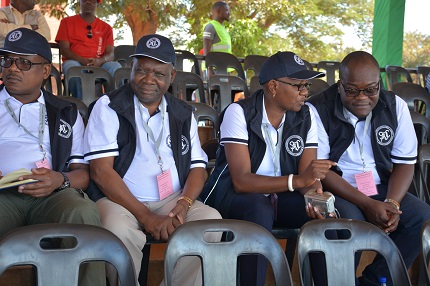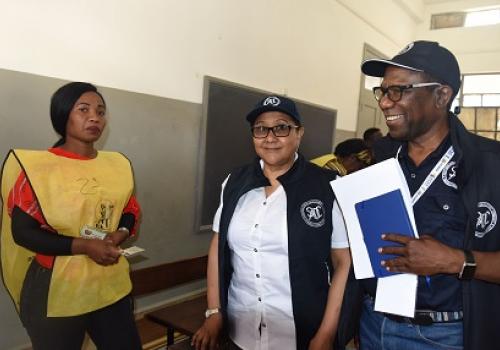Between 2018 and 2019, the SADC Electoral Observation Missions (SEOMs) were deployed to ten SADC Member States which held their national elections, namely: Kingdom of Eswatini and the Republics of Botswana, Comoros, Democratic Republic of Congo, Malawi, Mauritius, Mozambique, Namibia, South Africa, and Zimbabwe.
Pursuant to Article 4.1 of the revised SADC Principles and Guidelines Governing Democratic Elections (2015), Member States shall invite SEOMs to observe their elections, based on the provisions of the SADC Treaty, Protocol on Politics, Defence and Security Cooperation. To this end, Member States have committed to uphold the thirteen (13) Principles for Conducting Democratic Elections, which among others include the following:
i. Full participation of the citizens in the political process;
ii. Freedom of association, assembly and expression;
iii. Measures to prevent corruption, bribery, political violence, intimidation and intolerance;
iv. Equal opportunity for all political parties to access the State Media;
v. Respect for values of electoral justice;
vi. No undue restraints against the opportunity to exercise the right to vote and be voted for;
vii. Independence of the Judiciary and impartiality of the electoral institutions;
viii. Civic and Voter education;
ix. Acceptance of and respect for the election results by political parties as proclaimed to have been free, fair, transparent, credible and peaceful by the competent Electoral Commission in accordance with the law of the land; and
x. Provision of electoral justice through expeditious settlement of electoral disputes as provided for in the law.
In line with Article 8 of the aforementioned Principles and Guidelines, electoral observation serves to improve electoral integrity, mitigate electoral conflict, enhance public confidence and promote citizen participation in the electoral process.
SEOM Composition
The SEOM is headed by the Chairperson of the SADC Organ on Politics, Defence and Security Cooperation. Upon receipt of invitation letters from Member States for SADC to observe their national elections, the Chairperson of the Organ appoints the Head of Mission (HoM) to lead the Mission to the Member State holding elections. The Chairperson is supported by the Organ Troika, comprising of the Chairperson of the Ministerial Committee of the Organ (MCO), Incoming and Outgoing Chairpersons, and two members of the SADC Electoral Advisory Council (SEAC). The Chairperson may also appoint an Alternate Head of Mission to assist the Head of Mission.
The SEAC is a technical structure that advises SADC on all matters pertaining to electoral processes and the enhancement of democracy and good governance in the SADC region. In accordance with the principles and guidelines, SEAC undertakes its activities in three phases of the electoral cycle; pre-election, election and post-election periods. During the pre-election period, thus before SEOM is constituted, SEAC undertakes Goodwill Missions to among others, reflect on possible conflict situations in respective countries on matters pertaining to electoral processes and renders advice to the Ministerial Committee of the Organ (MCO) on the development of mediation strategies, before, during and after elections. During the election period, SEAC provides advisory services to the SEOM and the Organ Troika. In the post-election period, SEAC undertakes post-election reviews, which is of particular relevance should there be a conflict situation.
In line with Article 8.2.1 of the revised SADC Principles and Guidelines Governing Democratic Elections (2015), SEOM Observers are drawn from all Member States and are expected to meet the following criteria:
(i) They shall be citizens of Member States of SADC;
(ii) Preference shall be given to candidates with prior election observation experience;
(iii) A reasonable number of observers must have basic knowledge of at least one of the official languages of the country of deployment
(iv) Observation of gender balance; and
(iv) Observers to be constituted from among others: government representatives, Members of Parliament, military or security, civil society organizations, electoral bodies, and the academia.
The deployment of SEOMs is facilitated and supported by the SADC Secretariat in terms of logistical preparations and administrative arrangements. The Secretariat also facilitates the in-country deployment of Observers and the pre-deployment training, while Member States are required to meet all the costs related to travel and daily subsistence allowances.
Code of Conduct for Observers
The SADC Electoral Observers are guided by the Code of Conduct which prescribes the expected behaviour and conduct of observers during their electoral observation. The Code of Conduct, as stipulated in the SADC Principles and Guidelines Governing Democratic Elections, forms part of the training and orientation of all observers prior to deployment. No person is deployed as an observer without first undergoing training.
During their training, SADC observers are oriented on the political, electoral and security situation as well as the legal context of the election in the relevant Member State, in addition to the SADC Principles and Guidelines Governing Democratic Elections. The Code of Conduct for SADC Electoral observers stipulates, among others, the need to observe all national laws and regulations; maintain personal discipline and behaviour that is beyond reproach; maintain strict impartiality in the conduct of duties, and not to express any bias or preference in relation to national authorities, parties and candidates contesting in the electoral process; and to refrain from making personal or premature comments or judgements about their observations to the media or any other interested persons.
SEOM is also obliged to comply with the Electoral Code of Conduct for International Observation Missions in the respective Member State, the Constitution and Electoral Laws of the country.
SEOM Consultations
In order to come up with a well-informed report, SEOM undertakes extensive consultations with a broad range of political and electoral stakeholders with the aim of getting a deeper understanding of the political and security situation in the electoral process. Some of the key stakeholders include Government Leadership, Leaders and Representatives of Political Parties, Contesting Candidates, SADC Ambassadors Accredited to the Country Holding the Elections, Heads of Diplomatic Missions and International Organizations, the state security agencies, Electoral Management Bodies (EMBs), Non-Governmental Organisations, Civil Society Organizations, Academia, Traditional Leaders, Local and International Electoral observation Missions, Religious Groups and Faith Based Organizations, the Media etc.
As a standard practice and in line with the principle of subsidiarity, SADC hosts a meeting of all Heads of International Observation Missions, on the eve of the polling day. The African Union hosts a similar meeting one day after polling day. The objective of the meetings is to share notes and experiences so as to have a common understanding of the electoral matters before the observer missions present their statements, but also to invite them to join and share a platform with SEOM during the Release of the SEOM Preliminary Statement.
SEOM Preliminary Statement and Final Report
Two days after poling day, the Head of Mission releases the Preliminary Statement at a public forum. The Preliminary Statement covers the Mission’s observations of the pre-election and voting processes. The Preliminary Statement, among others, highlights the Mission’s observations in areas such as the political and security environment, participation of women, people with disabilities, and minority groups, the legal framework governing elections and the level of access to public media during the campaign period. The Preliminary Statement also highlights observations on the polling day and makes recommendations for improving the conduct of future elections based on the challenges encountered and drawing from international best practices in the management of elections.
In accordance with the revised SADC Principles and Guidelines Governing Democratic Elections (2015) SEOM’s Final Report is presented within thirty (30) days of the conclusion of the electoral cycle. Both the SEOM Preliminary and Final Reports draw largely from observations of deployed observers, consultations with political and electoral stakeholders, review of election-related legal instruments and media reports. The Final Report is submitted to the Chairperson of the Organ and to the Electoral Management Body of the Member State.

| Attachment | Size |
|---|---|
| Inside_SADC_-_November_2019_mail.pdf | 2.49 MB |

